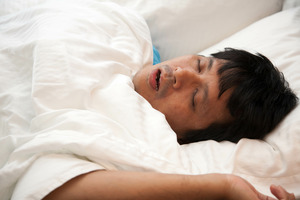
Unfortunately, the effects of sleep apnea aren’t limited to loud snoring or drowsiness. If the disorder stays undiagnosed and untreated for too long, it could have dangerous consequences for your health – and in the worst-case scenario, it could even shorten your lifespan. Your sleep dentist can explain the impact sleep apnea has on your body and how it can be treated.
How Sleep Apnea Affects Life Expectancy
Sleep apnea repeatedly stops your breathing while you’re asleep, which means your body isn’t getting enough oxygen during the night. As a result, you may be more likely to suffer from a cardiovascular event such as a heart attack. Furthermore, because sleep apnea often causes excessive tiredness (particularly in men), it could increase your chances of getting into an accident on the road or on the job.
Your sleep disorder could affect your lifespan in more subtle ways as well. Research has shown that untreated sleep apnea can accelerate the biological aging process. If your body is aging too quickly, it could have an adverse effect on your lifespan and your overall health.
On average, sleep apnea that isn’t properly treated could end up taking 12 to 15 years off your life. Naturally, this means you shouldn’t waste any time in seeking care if you believe that you have this disorder.
Do You Have Sleep Apnea?
Part of the reason sleep apnea often goes undiagnosed is that many people simply don’t pick up on the symptoms. Common warning signs (which may not be exactly the same for everybody) include snoring, fatigue, regularly waking up during the night, dry mouth, concentration problems, depression, and constantly having to make nighttime trips to the bathroom.
To know for sure whether you have sleep apnea, you will need to have a sleep test performed. This involves monitoring your vital signs while you’re asleep. If the test shows that you have a sleep disorder, you need to act quickly; oftentimes the correct treatment can reverse the damage before it can reduce your lifespan.
How Can Sleep Apnea Be Treated?
Many people think that the only solution for sleep apnea is a CPAP machine. However, a sleep dentist can sometimes offer oral appliance therapy as an alternative treatment for people who find their CPAP machine too noisy or uncomfortable. Oral appliances reposition the jaw in a way that helps prevent obstruction of the airway, making sleep apnea episodes less likely to occur.
Treating sleep apnea could be the key to leading a longer, more well-rested life. Reach out to your sleep dentist today to see what they recommend for your sleep disorder.
About the Author
Dr. Jay A. Nelson has achieved diplomate status with the American Board of Sleep & Breathing as well as the American Board of Dental Sleep Medicine. He favors a team approach for dealing with sleep disorders, and he offers oral appliance therapy for sleep apnea at his Wesley Chapel practice, Nelson Dental Sleep Medicine. To schedule a consultation with Dr. Nelson, visit his website or call (813) 733-4169.
